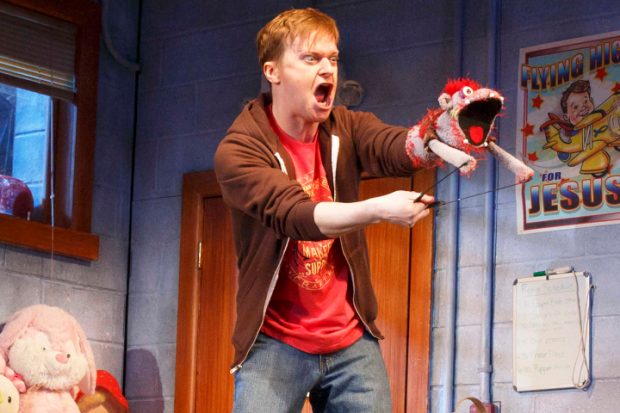
Hand to God, by Robert Askins. Booth Theater, New York, 2015.
If you like Martin McDonagh’s brutal and cringe-inducing plays you’ll love Hand To God.
This play starts as a serene domestic idyll and turns into a violent drama with blood gushing from its actors.
While McDonagh characters sit in the kitchen of their humble Irish village quaffing Complan and poteen, Askins’s folks start out playing with hand-puppets in the basement of a rural Texas church. These are simple, God-fearing people, the salt of the earth. But wait. Surprising violence awaits.
The playwright Robert Askins is a former minister who has written a vicious denunciation of religious hypocrisy. His creations try to use God’s words as a crutch in time of emotional needs and they totally fail. This black comedy about desperate humans erupts in rage of language and action.
Blood will gush. Audiences will grab their seats.
Margery is an uptight forty-something who was recently widowed. She tries to channel the conflicted feelings of their adolescent son Jason by keeping him busy with religious work — specifically, entertaining children (and teaching them God’s way) through performances with a sock puppet.
That puppet, named Tyrone, becomes the raspy voice of the devil within Jason. He is profane and sexually explicit as he seizes control from Jason and creates chaos. Tyrone expresses Jason’s bad thoughts and utters his unspeakable words while the other characters squirm and act out their own suppressed urges. This includes Pastor Greg, who starts out comforting Margery and then begins hitting on her.
Margery’s repressed desires express themselves in a wild scene that’s shocking and hilarious in its excess. And two powerless teenagers rebel against the adults who try to guide them with an athletic sex scene performed by their puppets.
Audiences will writhe, then they’ll laugh. You can take this tale as a lesson about hypocrisy or just as a platform for outrageous exhibitionism. Either way, it’s two hours of stimulating theater.
The redhaired Steven Boyer is a wonder as the shy Jason and his alter-ego, with rapid and complete delineation between the two, using changes of body language and voice. Geneva Carr is touching with her edgy depiction of Margery’s near-hysteria. Marc Kuditsch turns the supporting part of the pastor into a significant major role, while Sarah Stiles and Michael Oberholtzer are excellent as the other teens.
Moritz von Stuelpnagel directed this changing world superbly while Beowulf Boritt designed a set that’s cloying in its Christian cuteness, then turns into a vision of hell.
See other reviews in The Cultural Critic